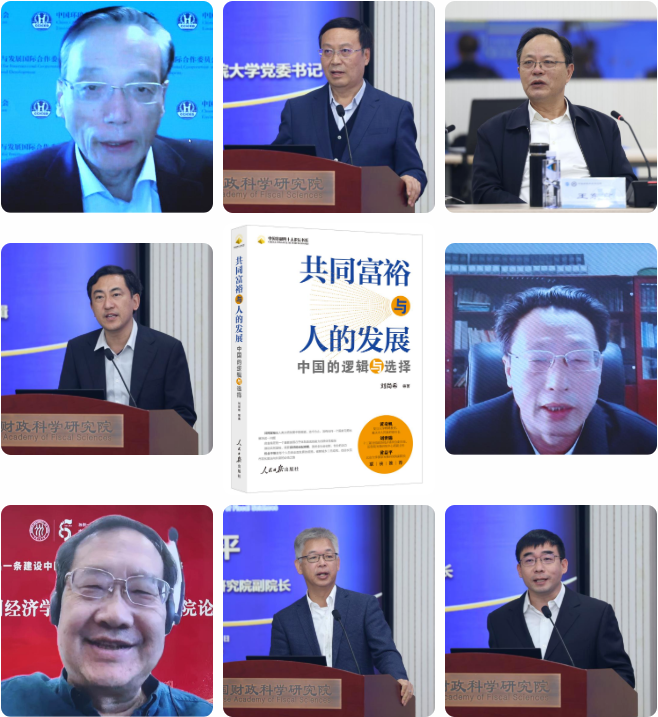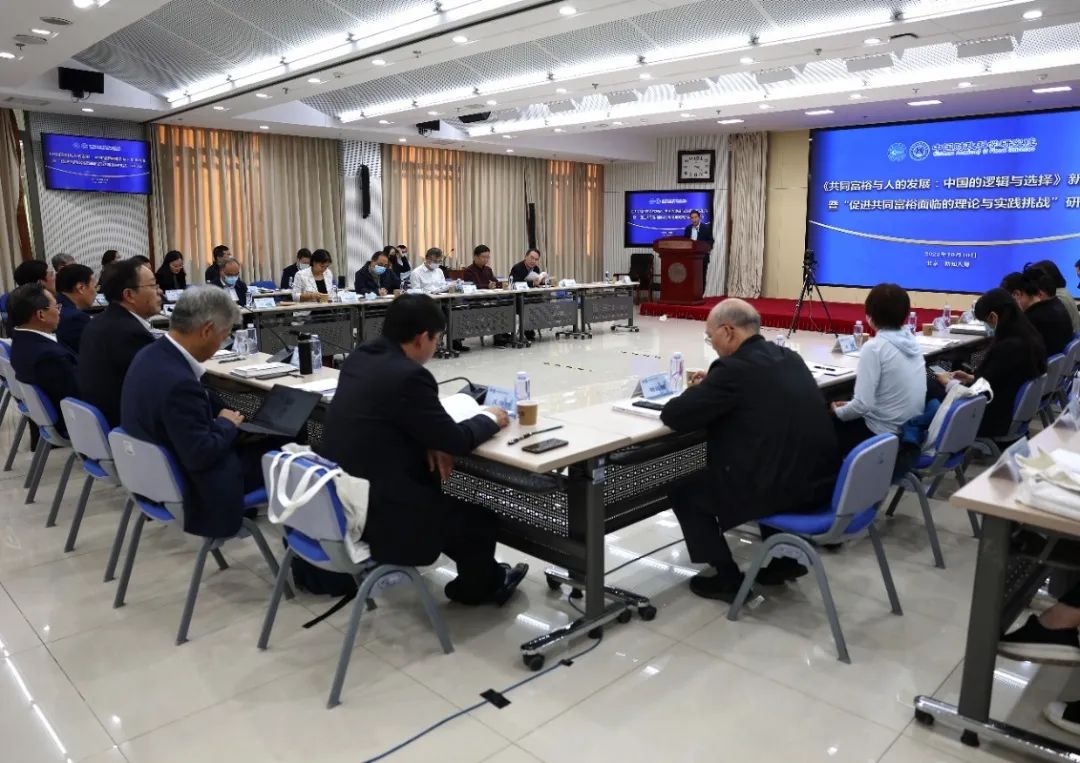Release of Common Prosperity and People’s Development: China’s Logic and Choices & Symposium on “Achieving Common Prosperity Requires Breaking through the Dual Challenges of Theory and Practice” Held in Beijing
Font size:Smallstandardlarge
On October 10, 2022, CAFS held the Release of Common Prosperity and People’s Development: China’s Logic and Choices & Symposium on “Achieving Common Prosperity Requires Breaking through the Dual Challenges of Theory and Practice” in Beijing.
Mr. Liu Shangxi, President of CAFS and Head of Compilation Team of the Common Prosperity and People’s Development: China’s Logic and Choices, released the new book and delivered a keynote address. A number of well-known experts and scholars were invited to the symposium, including Mr. Liu Shijin (attended the symposium online), Deputy Director of the Economic Affairs Committee of the 13th CPPCC National Committee and former Deputy Director of the Development Research Center of the State Council, Mr. Gao Peiyong, Member of the 13th CPPCC National Committee, Vice President of the Chinese Academy of Social Sciences and CPC Committee Secretary at the University of Chinese Academy of Social Sciences, Mr. Wang Dongjing, Member of the Financial and Economic Committee of the NPC and former Vice President of the Party School of the CPC Central Committee (National Academy of Governance), Mr. Wang Changlin (online), CPC Committee Secretary and President of the Academy of Macroeconomic Research, Mr. Liu Shouying (online), CPC Committee Secretary & President of the School of Economics of Renmin University of China, and Mr. Huang Yiping, Vice Dean of the National School of Development of Peking University. Mr. Ding Ding, Editor-in-Chief of People’s Daily Press and Mr. Wang Haiming, Secretary-general of China Finance 40 Forum (CF40) made remarks. The symposium was presided over by Mr. Fu Zhihua, Vice President of CAFS. Other CAFS leaders present include Mr. Cheng Beiping, Secretary of the Discipline Inspection Commission, as well as Dean Mr. Yang Yuangen, Vice Dean Ms. Xing Li (online) and Vice Dean Mr. Xu Yude from Graduate School. The symposium attracted nearly 40,000 participants online and offline.

According to Mr. Liu Shangxi, common prosperity has always been a major problem in the development of human civilization, and it needs a series of arduous, complicated and long-term processes. Achieving common prosperity is not only a world vision but also the only path to Chinese-style modernization. China remains afflicted by the dual challenges of theory and practice in present.
Theoretically speaking, common prosperity features rich connotations, among which three key issues require our contemplation. First of all, how shall we facilitate the integration of “prosperity” and “common”? This involves the relationship between efficiency and equality, which should be correctly understood from a perspective of Reconciliation Theory instead of Conflict Theory or Balance Theory,so that eliminate the “seesaw” effect between them fundamentally. Second, should common prosperity based on materials or on people? This concerns the relationship between material development and human development. We must go beyond the level of material distribution and ponder over common prosperity from human development because narrowing the group-based capacity gap and improving the capacity of all the people constitute the key to common prosperity. Third, how shall we guide in regard to distribution expectations? This involves the relationship between fairness of outcome and fairness of opportunity. The fairness of outcome must be achieved on the bottom line in order to bridge the unreasonable gap between the rich and the poor while prevent polarization. Except discussing fairness of outcome, it would be more important to pursue opportunities equality and ensure fair starting points and fair processes for the mass. This is actually an issue of distribution expectations,it requires to form a social pattern in which everyone participates, everyone works hard, and everyone shares under reasonable guidance. Practice indicates that China remains in the primary stage of socialism, as the world’s largest developing country, China is severely challenged by problems such as “getting old before getting rich” and “fast ageing before getting rich”, meanwhile China is still a “peasant society” in which peasants are principal part. Therefore, breaking the three “binaries” and further citizenizing farmers constitute the key to common prosperity. The first problem is the binary market economic system. Under the urban-rural structure, there are commodity market in rural areas but with no land market, housing market, mortgage market, or property rights market. For this reason, farmers can hardly get access to reasonable property income. The second problem is the binary social identity system. As labor forces, farmers have the freedom to go out to work, but as members of society, they have no freedom to migrate with family. Even migrant workers in cities could seldom entitled to equal public services, which limited the accumulation and use of human capital in rural families. The third problem is the binary public ownership system, mainly manifested in the differences between state ownership and collective ownership in property rights, powers, etc., result in the lower efficiency in rural areas than in urban areas generally. Overall, problems facing peasants are key issues for China to move towards common prosperity. Only by breaking these three “binaries” can we become capable of reducing urban-rural disparity, improving group-based capacity, and witnessing our nation truly towards common prosperity.

All present experts and scholars congratulated the release of the new book and spoke highly of original views and reasonable advice the book contains in terms of defining common prosperity, dispelling misconceptions, gaining insight into the essence of common prosperity, and seeking paths to common prosperity. An in-depth discussion on “Achieving Common Prosperity Requires Breaking through the Dual Challenges of Theory and Practice” was held in discussion session. Mr. Ding Ding commended the new book from the perspective of a press, praising it of revealing humanism, global vision and practical logic on the hotspot common prosperity from its key factor of people’s development at the strategic height of China’s logic and choices. Mr. Wang Haiming appreciated the Compilation Team’s fast completion of the book with good quality and belauded the release as good timing. Mr. Liu Shijin proposed three advices for promoting common prosperity, which is improving the social security system, providing more equal basic public services, and implementing the middle-income group doubling plan. Mr. Gao Peiyong responded to prevailing misinterpretations and partial understandings of common prosperity, and put forward the idea of equal consideration to efficiency and fairness. He said we should do our best but within our capacity to promote common prosperity progressively, practically and permanently according to the law of socioeconomic development. Mr. Wang Dongjing pointed out that common prosperity could not be seen as an issue of distribution or to equalize the rich and the poor simply, addressing development problems is the key to promoting common prosperity under socialist market economy, especially by encouraging and developing private economy. Mr. Wang Changlin expounded the rich connotations of common prosperity using a theoretical analysis framework, and briefed on the evaluation index system of common prosperity. Mr. Liu Shouying expressed opinions around how to narrow the gap between urban and rural areas and how to make farmers prosperous. He identified making farmers access to more rights, especially those migrant worker in cities, as the most important public policy to narrow the gap between urban and rural areas which lead to common prosperity. According to Mr. Huang Yiping, promoting common prosperity at this stage cannot be separated from financial efforts in three aspects actively, which includes how to boost economy by increasing financial efficiency, how to promote social equity through inclusive finance, and how to improve social security by developing insurance industry.

Common prosperity is an essential requirement for socialism and an important feature of Chinese-style modernization. Therefore, Mr. Liu Shangxi, together with his team, carried out a series of studies and published the Common Prosperity and People’s Development: China’s Logic and Choices. Distinct from the traditional framework of distribution, this book integrates common prosperity into modernization with people-oriented, interprets major theoretical and practical issues, such as historical logic and era value, scientific connotation and path choice, global cases and national landscape of realizing common prosperity.




